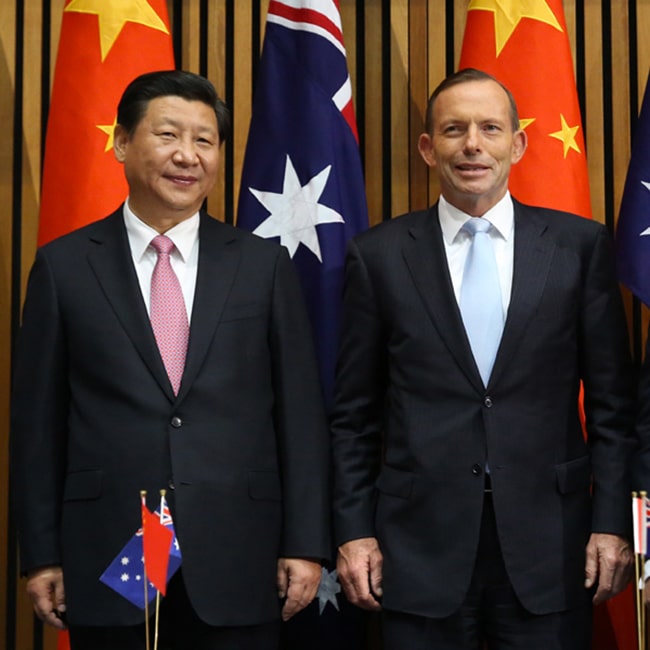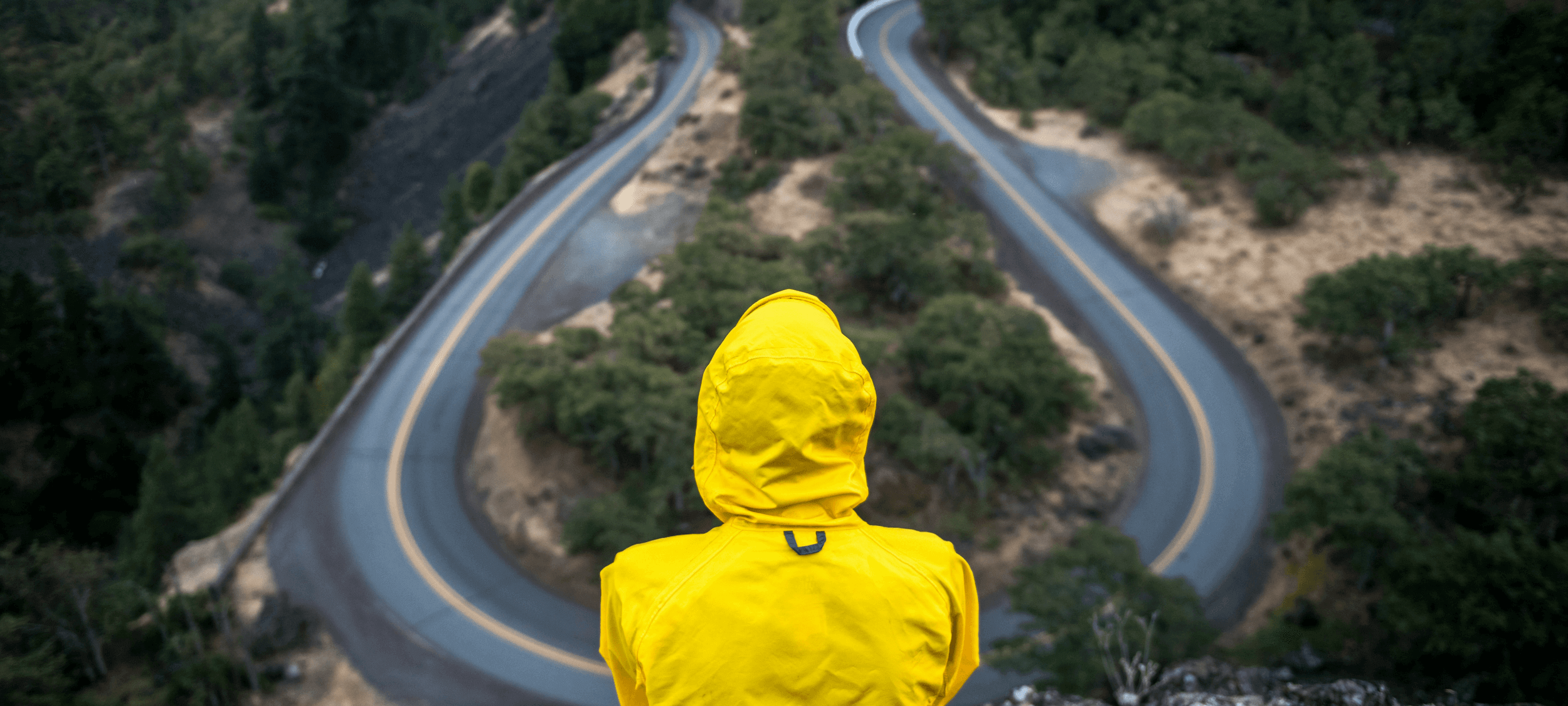Sir Geoff Mulgan on what makes a good leader

Sir Geoff Mulgan on what makes a good leader
Opinion + AnalysisBusiness + Leadership
BY The Ethics Centre 16 NOV 2022
Sir Geoff Mulgan has had a world of careers. Currently Professor of Collective Intelligence, Public Policy and Social Innovation at University College London, Mulgan discusses trust, power and what makes a good leader.
“There’s a risk in any relationship of power that it can amplify your vices as well as your virtues – vices of vindictiveness or meanness, of spirit or dishonesty. And I’m sure there’s some of that in me, probably because of my character faced by pressures and threats I’d be more likely just to run away and resign, rather than to become a sort of evil Adolf Hitler in the bunker type but you certainly see this in many other people.”
Geoff Mulgan has spent his entire career musing over the question: what makes a good leader? And not only that, but how you cultivate those skills and that mindset without becoming …a psychopath. This thinking prompted Geoff to write a book on this subject, in which he critiques the strong traditions within Christianity and Chinese philosophy. He explores the idea that what constitutes a good leader essentially depends on the ethics of the individual – that, if only you could find the right person for the right job everything would go swimmingly… through his vast research and experience, Geoff says this is completely wrong.
“We are creatures of our context. We are far more likely to be good leaders if there are constraints and pressures, if what we do is visible, if there are balancing forces and many people. Even apparently quite good people, if they can get away with things, will get away with those and they may start quite good. But five, ten, let alone 15 years later, if they’re still in power, they become evil monsters and again and again we see that at the global level.”
Are leaders scared of wisdom?
It’s in a leader’s interest to elicit a sense of awe and respect in their followers. They should be in possession of higher knowledge that can justify to those who work for them that they are worthy of that position. According to Geoff, that is why no leader can ever be completely transparent as they need to maintain this sense of mystery about their workings.
“As a leader I think you have to maintain an opacity, a sort of mystery about your knowledge and wisdom. You see it very clearly in how people talk about Putin or Modi or Xi. They wanted to project onto them this sort of genius, brilliant tactical, strategic genius, which we couldn’t understand. It’s sort of beyond comprehension, but we just sit back and admire it.“
And Geoff sees this behaviour amongst business leaders all the time – “the hagiographic magazine articles and books trying to cultivate an aura, a mysterious magical genius around their insights… which then suddenly collapses when the share price drops.”
Declining trust in institutions
When Geoff was working within the British government he said one of the biggest concerns internally was wavering trust in public institutions. As a result, he lead a large scale project under former UK Prime Minister Tony Blair asking the question: what could be learnt from how public institutions had lost and regained trust? He found the learnings for rebuilding trust were simple:
- Publicly acknowledge and apologise when something has gone wrong
- Articulate your moral purpose
- Perform your core function competently
The key positive that Geoff took away from this research was that: the problem of trust and trustworthiness is actually a fixable problem if you acknowledge it clearly and if you have the courage to really deal with it on these three key dimensions.
Is it possible to lead without getting your hands dirty?
“One of the weird things about leadership is you need a dual mind all the time of apparently opposite qualities – arrogance and humility, toughness and sensitivity, which need constantly replenishing and keeping in a balance… And if you drift too far in either direction, you won’t function very well.”
Geoff set up a young leadership training program in the UK, called “Uprising” and he explains the two dualities that he endeavoured to instil in the course which are:
- You have to be tough and have a thick skin. You’ll need to do things that are unpopular and unpleasant like firing people and closing things down and you need to be psychologically prepared to do that.
- On the flip side you also need to maintain your sensitivity, and not allow the aforementioned thick skin to destroy your ability to be kind and virtuous.
The second duality is: arrogance and humility
- Anyone becoming a leader needs to have a sense of arrogance, they need to believe that they are genuinely better than a million other people who could fill the role. Arrogance isn’t a bad thing, it’s a necessary thing to overcome setbacks, the personal attacks, the social media trolling and everything else that comes with being a public figure.
- But you also need to be humble. The humility to constantly learn and be open to new ideas.
In his experience, it is the young leaders who can manage to keep both of these sets of dualities in harmony who are the most successful.
The leaders of the future
We have a difficult few decades ahead of us, one that will be characterised by the accelerating climate crisis, widening inequality, austerity, and increasing inflation. Geoff believes that we will need to elevate the best people into positions of power if we are to emerge from the other side of this tumultuous time unscathed. His biggest fear is that, over the next few years the sorts of individuals who would make excellent leaders will shy away from the job because it’s too risky or too damaging to their private life, or just too difficult, and so we must persuade and elevate these individuals who possess that duality of arrogance and humility to put themselves forward and act.
“At the very heart of leadership is some sense of obligation and service to the whole community you are part of, realising almost everything you have has been given to you by others… Very little is created by yourself. And that gift requires a gift back.”
AUDIO: Listen to the full podcast discussion above
Sir Geoff Mulgan is Professor of Collective Intelligence, Public Policy & Social Innovation at University College London (UCL). He was CEO of Nesta, the UK’s innovation foundation from 2011-2019. From 1997-2004 Geoff had roles in UK government including director of the Government’s Strategy Unit and head of policy in the Prime Minister’s office. Geoff advises many governments, businesses, NGOs and foundations around the world. He has been a reporter on BBC TV and radio and was the founder/cofounder of many organisations, including Demos, Uprising, the Social Innovation Exchange and Action for Happiness. He has a PhD in telecommunications and has been visiting professor at LSE and Melbourne University, and senior visiting scholar at Harvard University.
Find out more about other conversations in the Leading with Purpose podcast. Delve into more articles and podcasts like this by signing up to our Professional Ethics Quarterly newsletter.
Ethics in your inbox.
Get the latest inspiration, intelligence, events & more.
By signing up you agree to our privacy policy
You might be interested in…
Opinion + Analysis
Business + Leadership
Leaders, be the change you want to see.
Opinion + Analysis
Business + Leadership
Self-interest versus public good: The untold damage the PwC scandal has done to the professions
Opinion + Analysis
Business + Leadership, Health + Wellbeing, Relationships
Office flings and firings
Opinion + Analysis
Business + Leadership, Health + Wellbeing
What your email signature says about you
BY The Ethics Centre
The Ethics Centre is a not-for-profit organisation developing innovative programs, services and experiences, designed to bring ethics to the centre of professional and personal life.
Susan Lloyd-Hurwitz on diversity and urban sustainability

Susan Lloyd-Hurwitz on diversity and urban sustainability
Opinion + AnalysisBusiness + Leadership
BY The Ethics Centre 16 NOV 2022
Susan Lloyd-Hurwitz is the CEO of Mirvac, one of Australia’s largest and most respected property groups. Driven by the company’s purpose, to Reimagine Urban Life, Susan talks about how we can redefine the landscape and create more sustainable, connected and vibrant urban environments, leaving a legacy for generations to come.
“When you’re in high school you can only imagine doing the jobs you can see – you can think about being a doctor, a nurse, a lawyer because those jobs exist. But I always say to my own children that the jobs that they’re going to do don’t even exist yet.”
Susan’s parents took a huge risk when they migrated from Belfast in Northern Ireland to Australia, during the Winter of Discontent in 1978 which was characterised by widespread strikes in the public and private sector. At the time she didn’t think much of it, but upon reflection admires the sacrifices her parents made to give her a better life. First in her family to attend university, Susan completed an undergraduate law degree, but upon completion the notion of being a full time lawyer didn’t appeal to her. Deciding to study urban geography, completing a thesis on the migration of Icelanders to Australia, she says it was this rather left field thesis that set her on the path to become the CEO of Mirvac.
“In one of those moments of serendipity I called my university supervisor and said “what does someone like me do for a job?” And he said he’d had a call that very day from Knight Frank, who were looking for a researcher. And I thought, I don’t know the first thing about real estate, but I can analyse, I can write, so why not? And I jumped into real estate and 30 plus years later I’m still in the industry, having worked all around the world for iconic companies. And it was all just that one moment, one phone call to my supervisor launched me off in this direction.”
Striving for a more diverse workplace
“At Mirvac I have tried very hard to ensure we are as gender diverse as possible, and not just gender diversity, gender is just one element of it – we have a full diversity and inclusion effort going on all the time.”
The academic research into diversity is clear: diverse groups make better decisions than homogeneous ones. It’s proven across cultures, across times and across industries. Susan believes that business leaders must be absolutely conscious at all times about diversity within their work force, because if you don’t play close attention, people default to the practice of hiring those most like them. The problem is, that while some elements of diversity are easily marked, diversity of ideas and thought is a lot harder to measure, she says, “it’s not just about having 50% females at the table, it’s a lot deeper than that. You can only measure the things that are obvious, like cultural background or sexual orientation or gender. You can measure those things, and just hope that they all bring some diversity of thought.”
“I’m very, very proud that at Mirvac we have a zero like for like gender pay gap and have maintained that for six years. And it is very hard to maintain if you if you take your eye off for one minute, the gender pay gap, with all the best intentioned in the world comes creeping back into the organisation.”
What keeps Susan Lloyd-Hurwitz up at night?
“The pace of house price growth is simply unsustainable, many multiples of times greater than wage inflation, which is very anaemic. So it is something that does need urgently to be addressed.”
Housing affordability is one of the most important challenges of our time, and Susan believes the problem lies with supply, “We simply don’t do enough dwellings for the growth of household formation in this country. It is a very serious problem and better or worse in different parts of Australia.” When thinking about solutions to the housing crisis and how we might build the cities of the future, Susan has proven that she thinks very much outside the box, conceiving of the idea of “a house with no bills”. “Imagine if you could live in a house and never pay another energy or water bill. Wouldn’t it be transformational for millions of people. What if we could design a different way of building homes so that we were creating no waste?”
A shift towards a more sustainable future
“The business of business is not just business. It is a lot broader than that. People sign up for a noble mission.”
Ten years ago when Mirvac launched the “This Changes Everything” sustainability strategy, with the goal of being net positive in waste water energy by 2030 (without yet having the technology to do so) people thought she was mad. “senior members of industry said you should never set targets that you don’t know how to meet”. Despite the opposition, Susan doggedly pushed on, and fast forward to 2022, Mirvac is now net positive in scope one, and in scope two emissions are 9 years ahead of schedule. She speaks about how rapidly the notion of sustainability is changing at every level of business from the C-suite to the consumer, “our residential customers who ten years ago, if you were talking to them about sustainability upgrades in their home or apartment, they would hear corporate spin and greenwash. And now they buy sustainability upgrades because they have a desire to live in a more impactful way and with a better impact on the planet.”
“Mirvac people generally don’t wake up in the morning and think, I’m going to go generate some earnings per share today. But they do get up in the morning and think about the legacy that they’re going to leave, how they’re going to push forward design and how they’re going to think about how we can design out our waste from our sites. Those are the things that get Mirvac people motivated, and they’re an extremely passionate group of people dedicated to leaving the world a better place than when we found it.”
AUDIO: Listen to the full podcast discussion above
Susan Lloyd-Hurwitz was appointed Chief Executive Officer & Managing Director in August 2012 and a Director of Mirvac Board in November 2012. Prior to this Susan was Managing Director at LaSalle Investment Management. Susan has also held senior executive positions at MGPA, Macquarie Group and Lend Lease Corporation, working in Australia, the US and Europe.
Susan is a Director of the Business Council of Australia, member of the NSW Public Service Commission Advisory Board, a member of the INSEAD Global Board, a Trustee of the Australian Museum Foundation, and the immediate past Chair of the Green Building Council of Australia. She holds a Bachelor of Arts (Hons) from the University of Sydney and an MBA (Distinction) from INSEAD (France).
Find out more about other conversations in the Leading with Purpose podcast. Delve into more articles and podcasts like this by signing up to our Professional Ethics Quarterly newsletter.
Ethics in your inbox.
Get the latest inspiration, intelligence, events & more.
By signing up you agree to our privacy policy
You might be interested in…
Opinion + Analysis
Business + Leadership, Politics + Human Rights
Character and conflict: should Tony Abbott be advising the UK on trade? We asked some ethicists
Opinion + Analysis
Business + Leadership
United Airlines shows it’s time to reframe the conversation about ethics
Opinion + Analysis
Business + Leadership
How can Financial Advisers rebuild trust?
Opinion + Analysis
Business + Leadership
What are millennials looking for at work?
BY The Ethics Centre
The Ethics Centre is a not-for-profit organisation developing innovative programs, services and experiences, designed to bring ethics to the centre of professional and personal life.
Tim Walker on finding the right leader

Tim Walker on finding the right leader
Opinion + AnalysisBusiness + Leadership
BY The Ethics Centre 16 NOV 2022
Tim Walker was Former Chief Executive and Artistic Director of the London Philharmonic Orchestra for over twenty years. Balancing its long and distinguished history with a reputation as one of the UK’s most adventurous and forward-looking orchestras, Walker discusses what it takes to grow a profitable business and find the right leader.
Tim Walker was nine when he started learning how to play the piano, and it was only upon attending his very first orchestra, that he realised how much more fun it was to play with other people. So that night, when he arrived home Tim promptly begged his parents to let him start learning the violin too. As a child, Tim was part of the youth orchestra at school, but after a while found it wasn’t really for him… but it was the notion of managing an orchestra, a job which still had that sense of creativity and community which had stolen his heart.
Finding the right leader
“Yes the conductor holds the musicians together but he or she is also using his or her knowledge and intellect to take the written note of the composer and turn it into something that communicates with us in the audience in a very visceral sense, I would say, because it’s not only something that should hit the heart, I think it also needs to hit the head as well.”
While the musicians in the London Philharmonic Orchestra are some of the most talented in the world, it’s the addition of the right conductor that really helps the players shine. The conductor’s role is to unify all the players to one single interpretation of the music, and while the experience of being in a symphony is entirely collaborative, someone needs to ensure everything is flowing seamlessly. But finding the right person for the job hasn’t always been easy. Traditionally in the 19th and 20th centuries, it wasn’t uncommon for a conductor to lead with an iron fist, however as times have changed, so too have conductor styles.
Growing a profitable business
“Interestingly, the London Philharmonic is one of the few orchestras in the world that actually made money from international touring.”
Before Tim joined the London Philharmonic, the company was solely focused on pursuing profit – the board justified each decision by demonstrating how it would contribute to the bottom line. According to Tim, many people make the mistake of thinking just because the individual elements of an enterprise can pay for themselves, then the sum total will be a sustainable enterprise. However, Tim says there are some avenues that need to be pursued not because they generate profit, but rather because doing those things positions the orchestra for the future. As a result, under Tim’s guidance the London Philharmonic recorded all the national anthems for the London Olympics and played at the Queen’s jubilee, not because they were profitable – but because they intrinsically felt like the right thing to do.
Do people still care about orchestras?
“I think, the people do take for granted a lot of the music in their lives as being sort of like wallpaper. I remember when I was talking to somebody who may not know the London Philharmonic, but as soon as I say we recorded all the soundtracks for The Lord of the Rings, suddenly they understand… But they don’t really.”
Over Tim’s twenty year tenure as Artistic Director and Chief Executive of the London Philharmonic, he reveals the hardest part of the job was just keeping everything going. The dilemma is though some would argue that enjoying art is a necessity, music is not the equivalent of food and basic services, so the purchasing of a concert ticket is something that in times of financial stress slows or stops altogether. “You can’t let the institution die on your watch… you’re responsible for 150 full time and 75 part time employees all dependent on ensuring that they can pay their mortgages and put bread on the table.”
Tim highlights that these last few years with COVID-19 have been particularly challenging as audiences are not flocking back as they had hoped.
Tim believes the way to forge a path out of the pandemic is to remind audiences that real people are making this music. The need for live music will never go away, but when you have 200 people whose livelihoods rely on ticket sales, then large orchestras won’t be around for a long time unless we start buying tickets.
“When you care for something, you’ve also got to care for how it’s maintained. So there needs to be a cost to care. And the care for orchestras is in people making the effort to actually go to concerts and appreciate what they have.”
AUDIO: Listen to the full podcast discussion above
Timothy Walker CBE AM Hon RCM was Chief Executive and Artistic Director of the London Philharmonic Orchestra. He was formerly the founder and Chief Executive of World Orchestras and prior General Manager of the Australian Chamber Orchestra. Mr Walker was on the Board of the International Society for the Performing Arts and was Chair of the Association of British Orchestras.
He was an inaugural member of the Australian International Cultural Council, and has served as a director of the London Philharmonic Orchestra, the Henry Wood Hall Trust and the Rachmaninoff Foundation.
Mr Walker has an honours degree in Arts, a Diploma of Music and a Diploma of Education from the University of Tasmania and a Diploma of Financial Management from the University of New England. He has been a consultant to the Australia Council, Create NSW, Creative Victoria, The Australian Ballet, the Australian Festival of Chamber Music, the Tasmanian Symphony Orchestra, the Sydney Conservatorium of Music and the Orcquestra Sinfonica do Estado de Sao Paulo.
Find out more about other conversations in the Leading with Purpose podcast. Delve into more articles and podcasts like this by signing up to our Professional Ethics Quarterly newsletter.
Ethics in your inbox.
Get the latest inspiration, intelligence, events & more.
By signing up you agree to our privacy policy
You might be interested in…
Opinion + Analysis
Business + Leadership
Who are corporations willing to sacrifice in order to retain their reputation?
Opinion + Analysis
Business + Leadership, Politics + Human Rights
Why fairness is integral to tax policy
Opinion + Analysis
Business + Leadership
Shadow values: What really lies beneath?
WATCH
Business + Leadership
The thorny ethics of corporate sponsorships
BY The Ethics Centre
The Ethics Centre is a not-for-profit organisation developing innovative programs, services and experiences, designed to bring ethics to the centre of professional and personal life.
Roshni Hegerman on creativity and constructing an empowered culture

Roshni Hegerman on creativity and constructing an empowered culture
Opinion + AnalysisBusiness + Leadership
BY The Ethics Centre 16 NOV 2022
Roshni Hegerman is one of the most awarded strategic thinkers globally. Currently JPAC Market Maker and Experience Director across sustainability and people with Oracle, she discusses creativity, psychological safety and how to construct an empowered culture.
When Roshni was a little girl growing up in India, she didn’t have dreams of being an executive or a director, she had much more humble aspirations to be a social worker. Though her parents didn’t feel it was a career path that could support a family long term, Roshni had her heart set on working with people at a local level.
With this in mind, she studied sociology and psychology in college, but then drifted into journalism and communications, which is where her marketing and communications career really begun. Although, she never did realise the goal of becoming a social worker, the ethos of social work and community has informed all of her decision making she says, “I get realy excited by the power of ideas and how they can connect with people and actually drive either a shift in perception or a shift in behaviour or give people a different lens to kind of view the world through that they wouldn’t have typically viewed it through.”
Be a radiator, not a drain
“I think that the traditional sense of creativity probably isn’t as valued as it could be. I think the use of creativity is to innovate and to do things differently and to think about how you’re going to connect in and change things in a positive way. So from that perspective, I actually think that creative thinking is the only thing that cannot be automated.”
Roshni believes that in the modern workplace, as we shift full speed into the world of automation, creativity and the capacity to think outside the box will actually be the most important skill set for young leaders and changemakers of the future.
One of the things that has stuck with her throughout her professional career is to “be a radiator not a drain”. Rather than be a drain she says, sucking the energy out of the room by sticking to the rules and following traditions, we should be radiators – empowering others, generating ideas, and inspiring new ways of thinking. “I think people are starting to realise that if you’re going to continue to do the same thing and get the same result, and the end and it’s not a positive one, then something has to change.”
Roshni often reflects on her professional practice asking a few key questions:
- How can I use my influence to be more of a radiator?
- Is there a more interesting or different direction we could consider?
- What’s stopping us from being more passionate about a project?
- How can I generate enthusiasm in my team?
- Embrace new and innovative ideas
She suggests that if you can be more of a radiator in your workplace, then people will naturally gravitate towards you, there will be less resistance to your ideas.
People who feel safe have the best ideas
“It’s when you feel like you have to meet a quota and you have to get something done that you tend to revert back to what you know and you don’t feel safe to kind of go out of that box and try something different. It’s when you have an organisation where employees feel safe to kind of give something a go and they’re empowered to be able to do that.”
In order to truly embrace one’s inner radiator, one must feel safe and confident within their team to share their ideas without fear of criticism.
Throughout her career, Roshni has explored the idea of psychological safety in the workplace environment. She suggests as leaders it’s important to create a space of safety in the workplace that allows people to feel more open to being more vulnerable whilst confident enough to have their ideas challenged.
She says, “I think it is very important to create an environment where where you don’t feel threatened by the ideas that you have. There needs to be an environment that allows you to feel at ease with sharing kind of a strong point of view, regardless of which direction you come from.”
Roshi works hard to identity the natural unconscious biases that stop team members from being curious because they believe they already know the answer. She emphasises that it’s important to consciously ask pointed questions and embed curiosity and innovation into every element of organisational structure and process in order to force people to look at things from a different perspective.
“I think it helps create a culture of discovery, empathy, curiosity, and opens up different possibilities of pathways that could be considered. So that’s one of the things I feel really excited by is going, ‘how do we consciously think about these things and what can we do to ask the right questions so that we are having the right conversations so that we can engage people’s curious mind to think about things differently?”
Contributing to a better world
“You need to be willing to have a lived experience. You can’t just say that you care about indigenous people or homeless people. You need to see it from their perspective and understand what they’re going through in order to be able to help in the way that they need you to help them, not how you want to help them.”
Despite diverting from the pathway to a career in social work all those years ago, Roshni maintains that the notion of caring for others and celebrating a sense of community has never left her. It’s important to consider the lived experience of different people, rather than assume what people need, you should strive to constantly be out in different communities and speaking to people directly in order to enrich your own perspective.
Roshni suggests it all comes down to realising that at the end of the day, we are all humans who want to be treated with dignity and respect. She believes in giving those who are underrepresented a voice, and a platform so they can get the help that they need. Her advice for the business leaders of the future is: It’s important to understand that it’s not all about you, that the world is about others, that you occupy it with. So how can you actually help make things better, not just for yourself, but for the people around you?
AUDIO: Listen to the full podcast discussion above
Roshni Hegerman is a force of nature with an unstoppable passion to move businesses and people, creating positive impact and change. Roshni currently is JAPAC Market Maker, Experience Director, with Oracle across Sustainability and People; and is founder of her own strategic creative consultancy, PinchofMasla. Roshni is global citizen unafraid of traversing new and unchartered terrain, in fact she relishes in it – working and thriving in United States, China, India and now Australia – with three beautiful children in tow. Roshni helped launch the iPhone in China, start-up BBH and BBDO in India; grow Coca-Cola’s footprint across Asia.
Roshni is a champion for diversity and inclusion and one of the most awarded strategic creative thinkers globally. She has started her own Women in Leadership networking group – “Ladies that Lunch,” to bring like-minded female leaders together to make meaningful change and collaborates closely with Igniting Change and Campfire X, tiny but meaningful organisations that spark big positive change. Roshni launched “Creating Meaningful Change” while at McCann Australia, a 365-day initiative, that puts conscious inclusion at the centre of the agency’s strategic and creative operating system.
Roshni believes that magic is found in the intersection of humanity, creativity and technology.
Find out more about other conversations in the Leading with Purpose podcast. Delve into more articles and podcasts like this by signing up to our Professional Ethics Quarterly newsletter.
Ethics in your inbox.
Get the latest inspiration, intelligence, events & more.
By signing up you agree to our privacy policy
You might be interested in…
Opinion + Analysis
Business + Leadership
Political aggression worsens during hung parliaments
Opinion + Analysis
Business + Leadership
The role of ethics in commercial and professional relationships
Opinion + Analysis
Business + Leadership
The truth isn’t in the numbers
Opinion + Analysis
Business + Leadership, Science + Technology
One giant leap for man, one step back for everyone else: Why space exploration must be inclusive
BY The Ethics Centre
The Ethics Centre is a not-for-profit organisation developing innovative programs, services and experiences, designed to bring ethics to the centre of professional and personal life.
Sylvie Barbier and Rufus Pollock on failure and fostering a wiser culture

Sylvie Barbier and Rufus Pollock on failure and fostering a wiser culture
Opinion + AnalysisBusiness + Leadership
BY The Ethics Centre 16 NOV 2022
Sylvie Barbier and Rufus Pollock are the partners in business and life who strive to build wiser future through culture, space and community. With a unique and innovative approach to business, the pair uncover the realities of being a leader, the importance of failure and fostering a wiser culture.
As a performer, Sylvie Barbier has a real passion for community. Her work is a tenacious exploration of the idea of “art as a conversation” and it’s these thematics of life, discussion, and unity which has equipped her to establish the Life Itself initiative. Together with her partner Rufus, a creative technologist and economist, the two have built a collective based in the half way space between Silicon Valley and the Plum Village in the South of France, which is engaged with creating a weller and wiser world.
On defining leadership
“There is an incredible thirst for leadership, not necessarily leaders – but for leadership.”
The world is in a moment of transition. There is an impending climate crisis, widening inequality as well as a huge amount of disunity and civil unrest, and Rufus believes that we must harness this specific moment in time to interrupt our current archaic notions of what constitutes a leader to craft something new and innovative. He suggests, “we are at a cultural moment where leadership is badly needed, but hugely undermined in part because of these past traumas that we are healing from.”
The reality of being leaders
“There’s always going to be a problem, you’re either not doing enough, or you’re doing too much and being oppressive.”
Having led multiple different initiatives through tech, art and community, both Sylvie and Rufus have learnt a lot about the process of leading. Now that they jointly lead Life Itself, they are encountering a whole new suite of hurdles and challenges as part of running the collaborative residency programs. The programs bring a collection of thinkers, creators, technologists and spiritualists together over an extended period to time to debate and engage with the challenges of the modern world.
Rufus says the hardest part is finding the balance as a leader, “invariably after three months there is some sort of crisis – someone is imposing too many rules, someone has to cook too often – and ultimately you are trying to facilitate the group to engage in a transformation and face these issues, what people must learn is that we need to engage with failure. We have an allergy to failure, but it’s these breakdowns which are the most valuable.”
When leaders fail
Capitalist culture dictates that when a company has some major failing – it is generally the CEO who must hand in their resignation. That the decks must be cleared for fresh blood and new ideas to flush out the old. However Rufus fears we may have gone too far, suggesting that we’ve descended into conducting “ritualised executions” when we decide someone needs to take the blame – just because the leader has left their position doesn’t mean the company will be any better off. Rufus suggests that it’s important to identify the source of the problem, and to think about the duties and responsibilities of leaders more holistically.
In reflecting on their own careers both Rufus and Sylvie acknowledge that they have made some mistakes, and at times mismanaged things. As he continues to learn about leadership, Rufus has let go of trying to achieve everything himself, saying, “leadership is about creating a space in which other people can flourish. I think more and more for myself, based on a huge number of errors, it is the act of creating space versus doing it myself which is central.”
Sylvie agrees, adding her biggest obstacle was she had a tendency to pursue ideals without being grounded in the reality of the world and the reality of who she is. She explores her issues with reconciling these two ideas, “sometimes I felt that the vision I had almost became a burden because it was my responsibility to make it happen. And if it doesn’t happen it’s my fault.”
In the past she was characterised by the ruthless pursuit of intangible goals, but found she was ultimately dissatisfied with this way of leading because when she achieved these goals she would immediately need to move on to something else and it felt particularly dissatisfying.
She concludes, “the world is already perfect the way it is, it doesn’t need to be any different than the way it is right now. And in a moment of radical acceptance, I realised I was already in paradise.”
AUDIO: Listen to the full podcast discussion above
Sylvie ‘Shiwei’ Barbier is a French-Taiwanese performance artist, entrepreneur and educator. Her work synthesizes Eastern and Western philosophies and aesthetics. She co-founded Life Itself to build a wiser future through culture, space and community. Her performance art pieces are contemporary rituals, where the audience is invited to take an active and interactive role. She uses language such as Koans as a bridge for the mind into the spiritual realm, by pushing us beyond the bounds of the intellect into a space of greater wholeness and connection.
Rufus Pollock is a technologist, entrepreneur, writer and long-term zen practitioner. He is the founder of Open Knowledge, an award-winning international digital non-profit. Formerly a Shuttleworth Fellow, Ashoka Fellow and a Mead Fellow in Economics at Cambridge University. His book the Open Revolution sets out a vision for a open, free and free information economy and has been translated into multiple languages. As a co-founder of Life Itself he brings curiosity and rigour to ongoing inquiry into how we can create a radically wiser, weller world for all.
Find out more about other conversations in the Leading with Purpose podcast. Delve into more articles and podcasts like this by signing up to our Professional Ethics Quarterly newsletter.
Ethics in your inbox.
Get the latest inspiration, intelligence, events & more.
By signing up you agree to our privacy policy
You might be interested in…
Opinion + Analysis
Business + Leadership, Politics + Human Rights
Housing affordability crisis: The elephant in the room stomping young Australians
Opinion + Analysis
Business + Leadership
Sell out, burn out. Decisions that won’t let you sleep at night
Opinion + Analysis
Business + Leadership
Ethical redundancies continue to be missing from the Australian workforce
Opinion + Analysis
Business + Leadership, Health + Wellbeing, Relationships
























